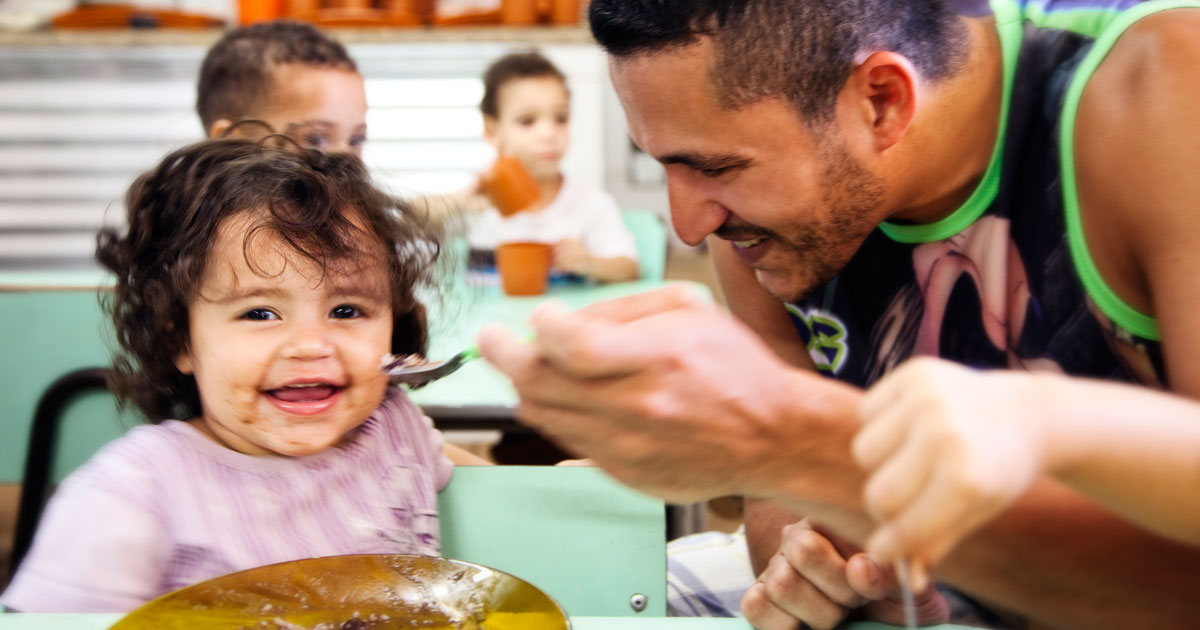
We asked 100 MenCare partners, practitioners, activists, and researchers from 50 countries to provide advice for fathers. What emerged was an abundance of thoughtful recommendations for gender-equitable caregiving for fathers and for all male caregivers, including those men who play influential roles in children’s lives as family members, teachers, coaches, and more.
In recognition of Father’s Day, happening in June in many countries around the world, here are eight pieces of advice:
1. You are capable of being a full caregiver.
“My piece of advice to anyone who is already a father, or is going to be a father, is you are capable of providing caregiving as much as your partner. So, do not hesitate to work and provide caregiving and support to your children, and your partner, or anyone else in your family. If you think you are capable of taking care of anything else, you are equally capable of taking care of a child, or a family member, or a partner.” —Laxman Belbase
Don’t let gendered stereotypes about parenting affect your desire or confidence in your ability to provide care. Childcare and chores are too often stereotyped as “women’s work,” but when men are equal partners at home, there are benefits for children, women, and men themselves. Additionally, research shows men are as hardwired as women to take care of children, and when men do take on this role, there are also benefits to health and well-being.
2. Be an equal partner in all tasks, and don’t expect special recognition for the “dirty work.”
“Don’t be afraid to spend time with your baby boy or baby girl and do everything that they need you to do with them, like cook, change the Pampers, walk them around when they’re having tummy pain … just to really do everything possible. These things, kids remember.” —Antoaneta Vassileva
Encourage all individuals, regardless of gender, to see themselves as both caregivers and financial providers. Men can and must do more than just “help” when it comes to raising a child. Being a truly equitable partner in care work – in all its messy glory – is critical for advancing equality in the home, the workplace, and in society at large.
3. Support your children’s self-expression, and don’t urge them to conform to rigid gender roles.
“Love your children and accept them for who they are. Don’t try to change them.” —Marina Parker
Work to move beyond rigid, limiting gender roles and toward what children need most to thrive. This is not merely a question of modeling healthy, nurturing masculinities, but also an issue of broader change. The work to challenge inequitable social norms must be gender-transformative, starting early and continuing throughout life, and embedded within existing structures such as early child development initiatives, health services and education, and parenting programs.
4. Gain trust and respect with love, not power and dominance.
“Everyone wants to love and feel loved. I think you can win love with love; you don’t win love with power and dominance – you win obedience. So, it’s important as a good father to show love, to show respect, to take responsibility, and to support your kids and spouse and your family in general.” —Besnik Leka
Remember that you are modeling behaviors for your children. Promoting respect and gender equality at home, particularly with regard to parenting, is a key step in empowering your children and advancing gender equality in society more broadly. When daughters and sons see their fathers in respectful, nonviolent, equitable relationships, they internalize the idea of equality and can pass this on to their own children.
5. You will make mistakes. You will grow and learn from them.
“At the end of the day … your love and concern for your child counts. You can always grow and learn through many different parenting programs and develop your skills.” —Suna Hanöz-Penney
Don’t be discouraged by making a mistake. Be involved, try your best, and meet each challenge, day after day, one step at a time. Parenting and developing close connections with children provides many with a sense of purpose and fulfillment.
6. Being a father is about more than play. It starts before your child is born, and it involves work.
“I think the most important thing is that fatherhood does not start when the baby is born. It starts way back before the baby is born, when your partner is still pregnant. … The other thing is also being involved; supporting your partner with unpaid care duties.” —Andre Lewaks
While playing with your children is important, it’s also important to share other forms of care work. When fathers engage in housework and childcare, this contributes to boys’ acceptance of gender equality and to girls’ sense of autonomy and empowerment. Research finds that daughters with fathers who share domestic chores equally are more likely to aspire to less traditional and potentially higher-paying jobs.
7. Open and healthy communication with your partner is key. Discuss and acknowledge both the physical tasks and the mental load.
“Always discuss – a discussion by the couple – the tasks to be completed, but also the responsibility of who takes, in the end, the mental responsibility for what will be done.” —Carine Troussel
Recognize and redistribute both the tangible work and the intangible: the burden of planning, organizing, reminding, and logistics. This famous comic series explains the concept of the mental load that women tend to inequitably bear.
8. Listen to your children and make decisions with them. Empower their voices.
“The piece of advice I would give to many fathers is just to listen to their children carefully, taking their children’s views into consideration, and working with their children to make decisions.” —Koshuma Mtengeti
Nurture your children to grow up feeling resilient and empowered. When you teach children to respect others and treat all people equally, you’re teaching them that they deserve a future full of opportunity and equality too.